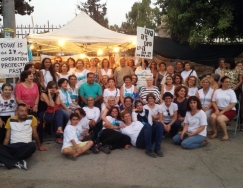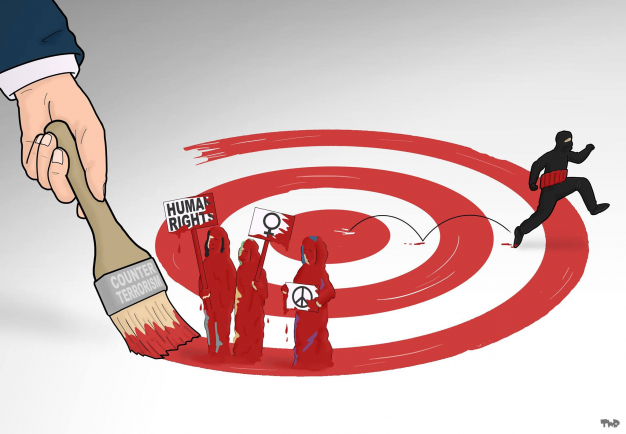Column written by Aura Hammer
I fasted on the 11th of August this year. I sat in a white tent in a white t-shirt with a turquoise ribbon, with women from all across Israel who, like me, could no longer sit back and wait. A whole year had passed since the last Gaza war, and there are no signs that our government is trying to advance any kind of peace agreement. So, this is how we commemorated that terrible war: 50 days of women in white, fasting in front of the Prime Minister's office. Hundreds of women have fasted, each for a day or two at a time.
It was a typical day at the tent: two parliament members from a central party came and sat with us. They both agreed to create a round table in the parliament with members of various parties and delegates from Women Wage Peace. On the same day, a group of Palestinian women visited and promised to start a parallel women's group in Palestine. Many parliament members of a wide range of political views have come to sit with us, writers and artists have come to support, even the Prime Minister's wife invited a delegation of the women to her home. After a year of work, the media has also begun to take notice of our actions.
Just over a year ago, in July 2014, the second Gaza war began. The call to violence and hatred was stronger than it had ever been before. Beyond the terrifying violence of missiles, planes, bombs and guns between defined enemies, we found that within Israel even young children spoke and acted violently and no one was safe in the streets if they questioned or spoke out against the war. A country in a constant state of war inevitably fosters violent behavior within its people. Fear, distrust and hate follow each other. It begins at the border, turns back into the society and finally it turns inward into ourselves. We distrust, not only each other, but our own judgment, instinct, knowledge and experience.
We who still questioned the decisions made by our government felt helpless. We found we could not express our questions, much less our disagreement. After years and years of working for peace, I had finally reached the breaking point of hope.
Then, we found each other on Facebook. Women who couldn't speak in person began to speak on the Internet. Women Wage Peace was born as a place to say “NO! This is not right; I want to change this reality”. As suddenly as it was born, the movement grew – quickly, massively. Once we had discovered each other, there was no stopping us.
In August, there was a ceasefire in the War in Gaza, and by November we officially launched the movement in a wonderful opening action. One thousand women from all over Israel got on the train to Sderot – the closest town to Gaza – the Israeli town that had suffered more than any other Israeli town in the last wars. From the northernmost tip of Israel, the train going south filled with women at each stop. We rode the Peace Train together, full of hope and song – 1000 women in white. Yes, people cursed at us, they shouted at us and called us names, but we were strong together. We arrived at Sderot and walked from the train station along the highway to the college where a national congress was taking place. There we spoke to all present, and officially opened Women Wage Peace.
Since that day, we have grown and developed into a strong force of women. We work as a grassroots movement, as a feminist movement, as a peace movement. We are a nonviolent group, and more than that, we are a positive action group. We are now 14.000 strong, with about 15% of our members being men.
Women Wage Peace has its roots in the long international tradition of women's movements. It is inspired by movements such as the Four Mothers Movement that got Israel out of Lebanon, the women peace activists who ended the war in Liberia, the Grandmothers of the Plaza de Mayo in Argentina and others. We do not speak against people or parties, only push forward our demand to go back to the tables and work out an agreement. Our main goal is to influence politicians and opinion makers to work vigilantly towards achieving a sustainable peace accord. We do this by approaching them directly, but also through pressure applied by the Israeli public. We aim to support women’s roles in leadership, planning and decision-making in the negotiation process.

Our activities include nonviolent demonstrations, reaching out to politicians and policy makers (though we make sure not to be affiliated with any political party), reaching out to women through small home group meetings, lectures films and discussion groups, etc. And so we work: talking to people one on one, in home groups, intersections, rallies and more.
In a country divided into left and right wing groups, we are trying to break this mode: turning to women as a positive influence for change, no matter where they live, what age they are, or what their political affiliation may be. There are those who call us traitors for even thinking of peace, and at the other end of the spectrum, there are those who think our message is not strong enough. Still, this movement is revolutionary in the atmosphere of Israel today: where the word peace is almost synonymous with traitor, where people raise children without ever having hope that they will live in peace.
It is clearly time for women to step forward into their rightful roles in the world, to lift their voices for the best protection possible for the next generations: peace!
For more information about Women Wage Peace have a look at their website and Facebook page.
Born in 1957, in New York, Aura moved to Israel with her parents in 1973. She studied architecture at the Technion in Haifa and worked as an architect for many years until she discovered her passion for working for peace. She began by co-founding a local grassroots co-existence group in the Galilee, her home. It was called “Schenim-Jiran – Neighbors”. She studied facilitation and organization, creating and facilitating women’s groups, summer camps, dialog groups, twin-kindergartens and more. Through her studies she became involved in the Women’s co-existence program “Beyond Words”, working for many years facilitating Arab and Jewish women’s groups. Together with three partners she founded a women’s learning and community center in Nazareth called “Women in the Center” for the purpose of empowering the women’s voice for peace. Today she teaches and facilitates Council Circles and sustainability to educators and community activists. She is now coordinator for the Upper Galilee group for Women Wage Peace and is also involved in its Diversity Team.
11 Dec '17 This month WPP staff interviewed Arbia Jebali and Sarah Chamekh from Free Sight Association in Tunisia about the work their organization does, how civil society space has changed over the years, which challenges they are facing now, and how civil society in Tunisia is organizing itself to overcome those challenges.
7 Nov '17 In this article, WPP staff interviewed Doron Joles of XminY Fund, an activist organization that supports social movements, action groups and changemakers fighting for a fair, democratic, sustainable and accepting world. He discusses the unique way they have chosen to hand out funds, and the challenges that go along with funding small activist organizations in the current global climate.

25 Oct '17 This Friday, the UNSCR 1325 Open Debate will take place once again, seventeen years since the adoption of landmark UN Security Council Resolution 1325 on Women, Peace and Security. In this article WPP staff reflects on the progress made for a truly transformative feminist peace agenda until now.
